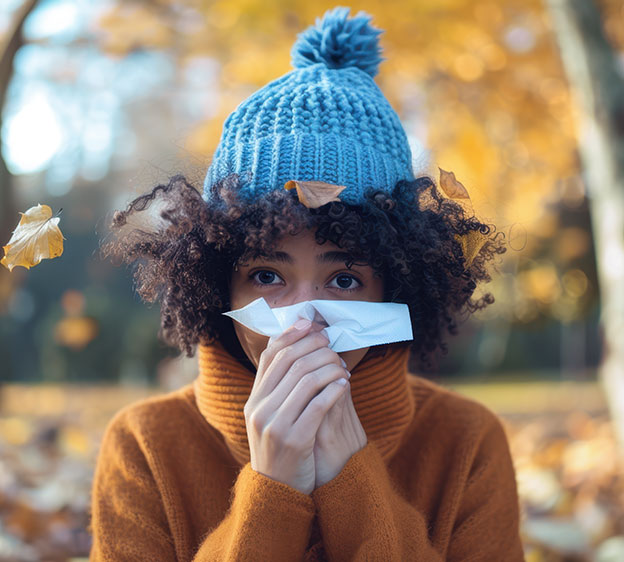
You’re outside, enjoying the first leaves of fall when your nose starts to run, and your face feels congested. What’s going on?
You may be experiencing the effects of ragweed season.
Ragweed is a potent allergen that affects millions of people annually, particularly during the ragweed pollen season when pollen counts are high. Knowing more about ragweed, its symptoms and how to manage your allergies can make this time of year more bearable.
What is Ragweed and Ragweed Season?
Originating from a plant that produces a significant amount of pollen, ragweed is a fine powder that can travel up to 400 miles through the air to spread allergens far and wide. The ragweed season typically starts in late summer and continues through early fall. If you’re allergic to ragweed, allergy symptoms can typically be the most intense in August or September, when pollen counts are at their highest.
What Are the Symptoms of a Ragweed Pollen Allergy?
Ragweed pollen can trigger various symptoms, including:
- Congestion
- Coughing
- Fatigue
- Itchy or watery eyes
- Itchy throat
- Runny nose
- Sneezing
“It’s important to work with your provider and stay ahead of the ragweed allergy season if you’re allergic or experience allergic symptoms like sneezing and congestion,” says James Varner, board-certified physician assistant at Beaufort Memorial Lowcountry Medical Group Primary Care. “There are lots of options to help relieve your symptoms and even prevent them from occurring.”
Some people can also develop oral allergy syndrome (OAS). If you have OAS, certain fruits and vegetables with proteins similar to ragweed pollen can cause itching or discomfort in your mouth and throat. Other conditions, like asthma, can worsen during ragweed allergy season.
“For those with asthma and ragweed allergies, talking to your primary care provider to determine a personalized allergy treatment plan can significantly improve symptom management and quality of life,” Varner says.
Read More: Allergies and Asthma: Symptoms and Treatment
Ragweed Allergies Far and Wide
Ragweed significantly contributes to pollen allergies across the United States, affecting 26% of adults and 19% of children. The plant thrives in many regions, and its pollen can travel up to 400 miles, making it challenging to escape ragweed's impact.
The length of pollen season — including ragweed pollen season — is increasing in some parts of the United States. Rising temperatures and elevated carbon dioxide levels contribute to the accelerated growth of ragweed, leading to an increase in the quantity of pollen produced, which is also more potent in terms of allergenic properties.
The bottom line? If you have a ragweed allergy, you may experience symptoms longer and, in some cases, more severely.
Read More: Help for Seasonal Allergies — All Year Long
How to Manage Your Ragweed Allergy Symptoms
Dealing with a ragweed pollen allergy can be challenging, but there are ways to reduce exposure and minimize symptoms. Here are some effective strategies to help you manage your allergies during ragweed season:
- Keep indoor air clean: Close windows and doors to keep pollen from entering your home. Use air conditioning with a clean filter to help reduce indoor pollen levels. High-efficiency particulate air (HEPA) filters can also help remove pollen and other allergens from the air in your home.
- Limit outdoor exposure: When pollen counts are high, limit your time outdoors, especially on windy days when pollen can easily hitch a ride and travel long distances. If you need to be outside, wear sunglasses to protect your eyes, and consider using a mask to minimize inhaling pollen.
- Monitor pollen counts: Stay updated on local pollen count levels, often available through weather apps or local news channels. On days when the pollen count is high, consider staying indoors as much as possible, especially in the early morning when pollen levels tend to peak.
- Shower after outdoor activities: If you've been outside during ragweed pollen season, shower to remove any pollen that may have clung to your skin or hair and change your clothes in case pollen hitched a ride on them. These simple steps will help prevent pollen from sticking to your bed or furniture, where it can continue to cause symptoms.
Treatment Options for Ragweed Allergies
Different types of treatments can help manage symptoms during ragweed pollen season. Depending on the severity of your allergies, over-the-counter medications or prescription treatments may be necessary.
- Allergy shots: Also known as immunotherapy, allergy shots involve regular injections of small amounts of the allergen, which helps your body build up tolerance over time. These injections can significantly reduce allergy symptoms and make future pollen seasons more manageable.
- Antihistamines can help relieve sneezing, itching and runny noses by blocking the action of histamines, the chemicals released by your body during an allergic reaction.
- Nasal sprays include corticosteroid and antihistamine sprays and can improve symptoms. Steroid nasal sprays can help reduce inflammation in the nasal passages, relieving congestion and sinus pressure. Antihistamine nasal sprays reduce swelling and itching when you're exposed to allergens. If your allergies tend to act up long-term, corticosteroid nasal sprays may be the better option.
“If your allergy symptoms are severe or persist despite taking preventative measures, talk to your primary care provider about being tested to determine if allergy immunotherapy might be a good option for you,” Varner says. “Your primary care provider can also refer you to a board-certified allergist, who can recommend treatments to help reduce your sensitivity to ragweed pollen over time.”
Long-Term Outlook for Managing Ragweed Pollen
Researchers believe the ragweed pollen season may continue to lengthen. If you're among those allergic to ragweed, you may experience allergy symptoms for more extended periods each year. Your best defense is to stay informed about changes in pollen seasons and take proactive steps to manage your symptoms.
If you need help with allergies, start a Video Visit with BMH Care Anywhere or find an Express Care Clinic near you.

